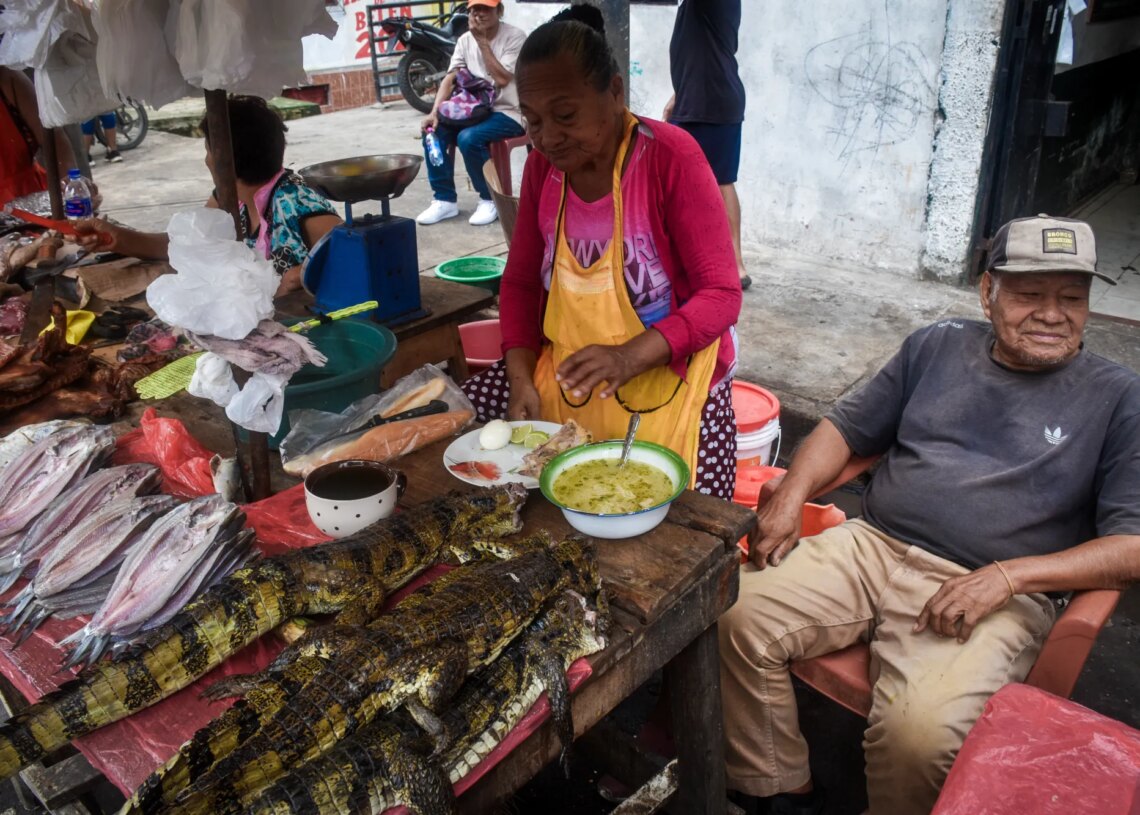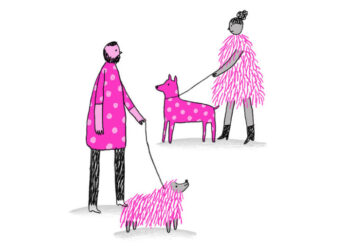This article contains images that some may find upsetting.
A common first impression of Belén, a floating Peruvian city with a sprawling wet market on the edge of the Amazon rainforest, is “Christ, this place stinks.”
Belén market sells just about anything. Bottled ayahuasca. Shish kabobs made from grilled larvae. Skinned howler monkeys. Yellow-footed tortoises, gutted alive and sold to women with the promise that the meat tames jealous men. The skin of a jaguar, steaks made from sliced caiman, and giant containers packed with turtle eggs—all of which are sold alongside more mundane items, like flour, sugar, and rice. Belén, in other words, is a one-stop shop for the Amazonian town of Iquitos’ local residents. It’s also a powder keg for disease.
“If an epidemic ever happens in Peru,” a local guide told VICE, “it’ll have started in Belén, I swear to God.”
Wet markets like Belén tend to get a bad rap. A really bad rap. For a long time the Huanan Seafood Wholesale Market in Wuhan, China, has been posited as ground zero for the Covid-19 pandemic. The very first Covid-19 cases in people were reported there, and most of them were traced to a particular corner of the market where vendors sold wild animals in cramped, unsanitary conditions; raccoon dogs, hedgehogs, bamboo rats, complex-toothed flying squirrels, civets, badgers, and minks were all crammed together, to be sold as pets and food.
Of course, the actual origins of the pandemic are still highly disputed. Regardless of how it started, however, one thing is certain: Covid-19 is a zoonotic disease. In other words, a pathogen that’s transmitted between animals and humans. And some wet markets pose a risk of zoonotic spillover.
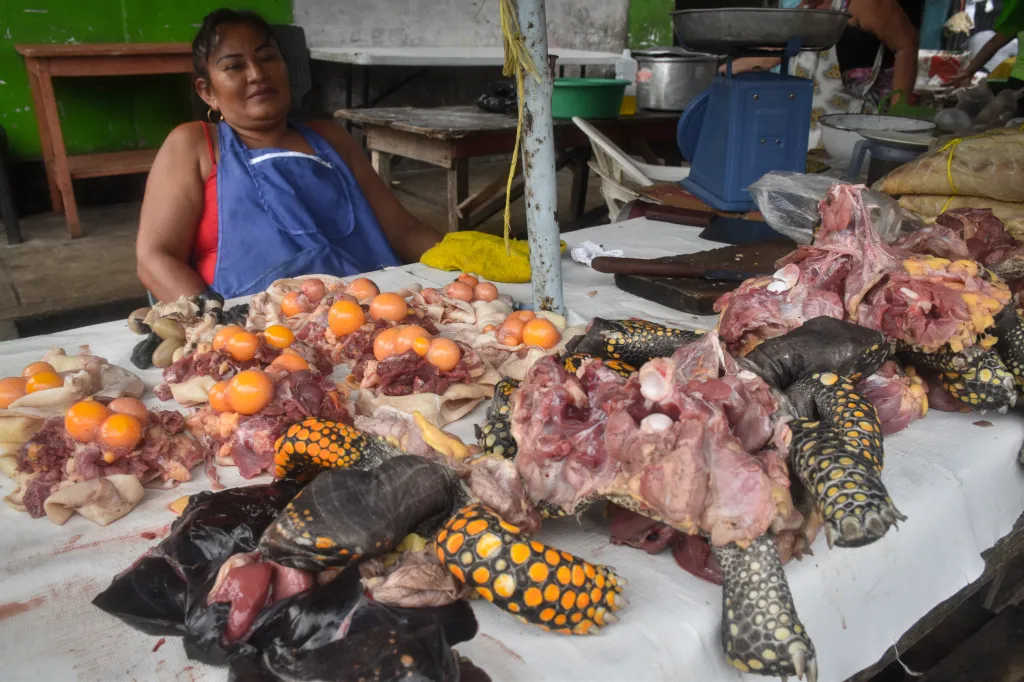
Speaking on efforts to curb the spread of Ebola in 2024, Dr. Rebecca Katz, a global health expert at Georgetown University Medical Center and former Covid-19 adviser to the Biden campaign, told VICE that the assumption in the medical community is that another pandemic is inevitable. And zoonotic diseases, she said, are “what we worry about most.”
That shouldn’t come as a surprise, considering that over three quarters of new infectious diseases are zoonotic in origin.
Bing Lin, a journalist and postdoctoral research associate at the University of Sydney, told VICE that the majority of wet markets are harmless. Many in Europe and North America are more akin to a farmer’s market than a dangerous emporium capable of causing the apocalypse. The real danger resides in the small fraction of markets dealing in live and wild animals, he said. “When wild animals are mixed with livestock and sold live next to meat and seafood, the chances for viruses to ‘jump’ species go way up,” Lin said. “Add poor sanitation, stressed animals, and constant human contact, and you’ve got a recipe for spillover.”
In the wake of the pandemic, and despite the fact that most zoonotic transmissions come from industrial farming and domesticated animals, the “overwhelming response to Covid-19 was ‘ban the wildlife trade,’” Dr. Dilys Roe, the principal researcher at the International Institute for Environment and Development, told VICE.
The political effort to do so, however, has largely failed.
Wet markets in Belén, Wuhan, as well as those in Africa, Southeast Asia, and elsewhere in Latin America, were supposed to either shut down or get a total sanitary makeover. China largely followed through; it shuttered many of its wet markets, even banning aspects of the illicit wildlife trade outright. The World Health Organization called for a permanent global ban on live wild animal sales, as well as improved hygiene and regulation in wet markets. There was even a United Nations plan in place to overhaul Belén completely.
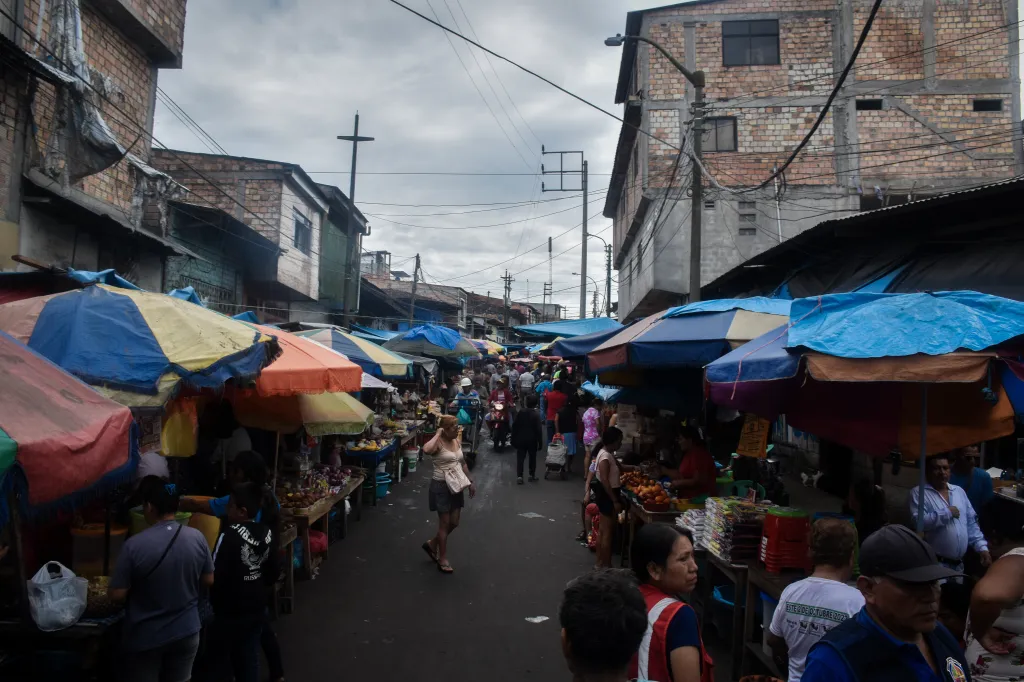
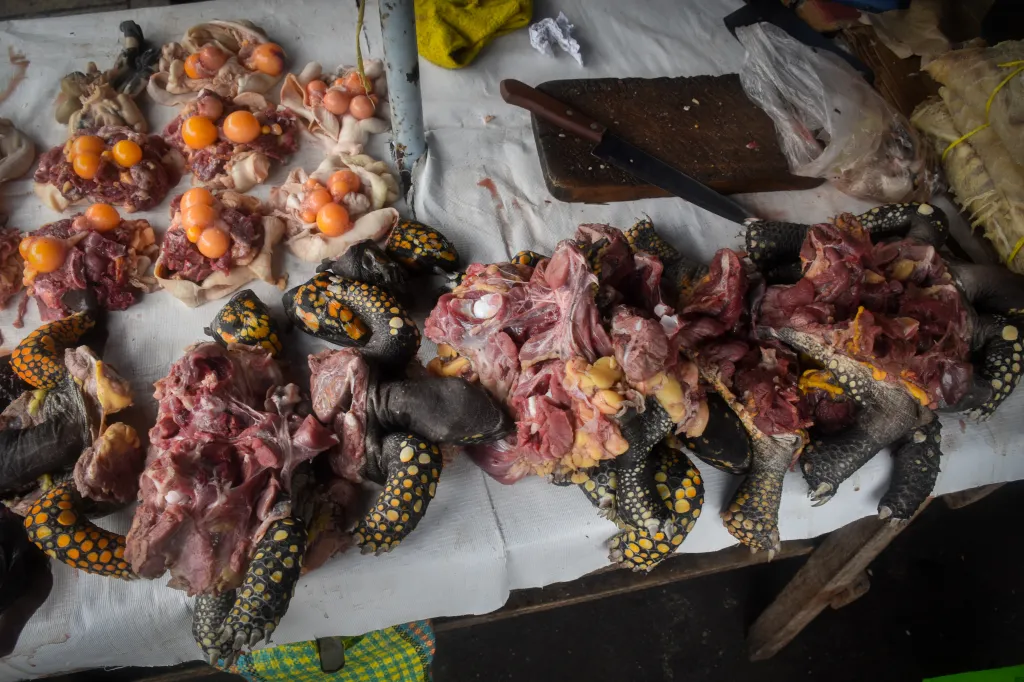
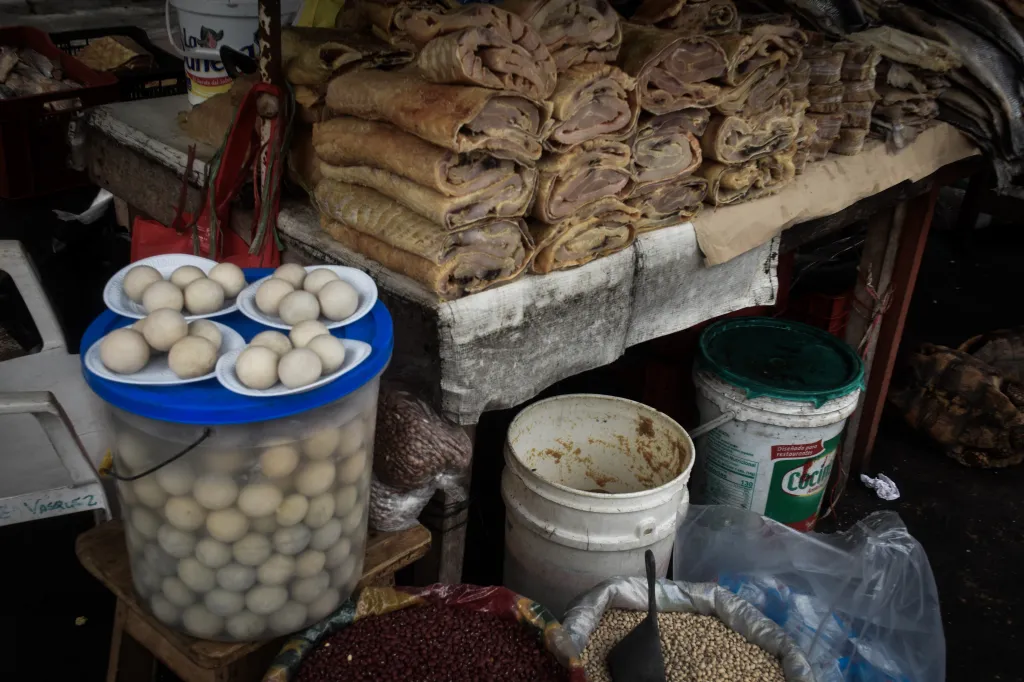
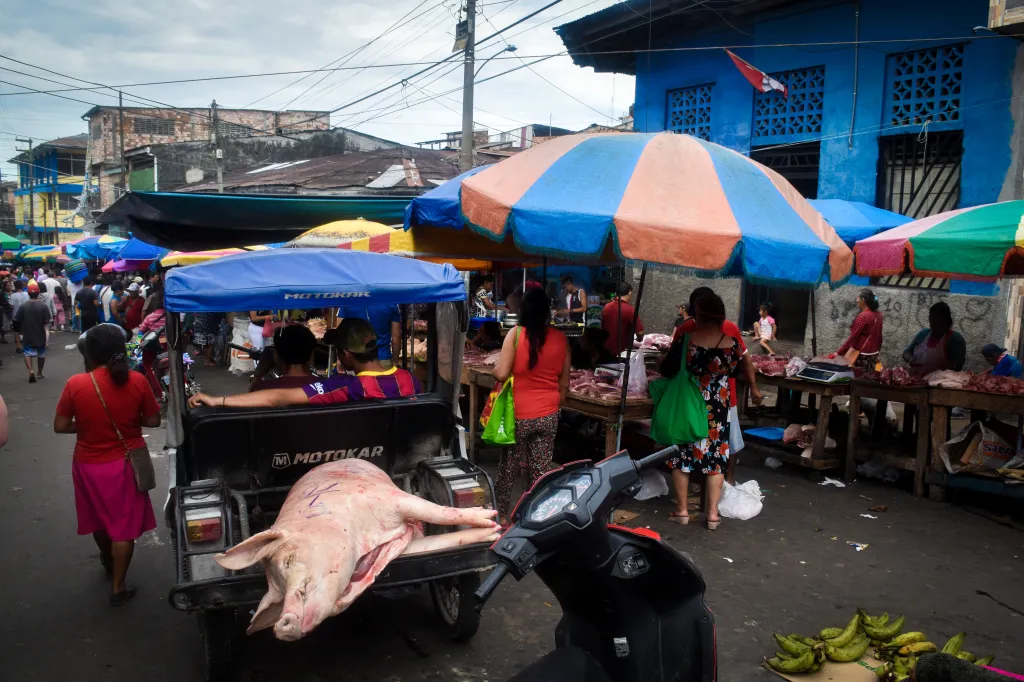
But none of it materialized. Within a few years, many wet markets around the world came roaring back to life, returning to their former disgusting glory.
“With the pandemic’s origins still unresolved, the global pressure to reform wet markets soon faded,” Lin explained. “Plus, these markets are a way of life that sustain millions of livelihoods, so overhauling them can be infeasible. Targeting high-risk wet markets makes more sense than trying to fix the whole system, but even that takes money, enforcement, and political will—all in short supply.”
Dr. Roe echoed this, adding that many markets, including those in West Africa, Indonesia, Thailand, Vietnam, India, and the Congo and Amazon basins, are informal, ad hoc, remote and rural, places difficult for authorities to identify in the first place, let alone properly regulate.
“Many places where markets occur lack the resources and capacity to put in place the necessary food hygiene, animal handling standards, and biosecurity measures that would be needed to effectively contain diseases,” she said. “And many of the clients of these markets are poor people who similarly don’t have the luxury of being bothered about things like food hygiene. In the case of wildlife markets, some of this is illegal and so by definition, unrecorded and hence unregulated.”

In Brazzaville, the Republic of the Congo’s capital, the Drage (or marche de Dragage, as it’s called in French) is a nocturnal wet market. There, muddy stalls sell unrefrigerated bats, rodents, and reptiles under the pale Congolese moonlight. Wet markets elsewhere in the Congo Basin sometimes sell bushmeat from the jungle, often gorillas and chimpanzees. Bushmeat is linked to Ebola, HIV, monkeypox, and Henipavirus. In fact, an Ebola outbreak in 2001 is rumored to have started in one such wet market.
In much of the Global South, Lin said, wet markets aren’t a luxury, but a part of daily life. “They bring fresh, affordable food where supermarkets and refrigeration are rare, and they’re a lifeline for small farmers, fishers, and vendors who rely on selling directly to communities.”
Reform, then, can be a political and social tightrope. Blanket bans often backfire, which drives the wildlife trade underground. A smarter approach, according to Lin, is targeted reform: better hygiene and infrastructure, keeping live animals separate from food stalls, regulating the wildlife trade, and giving vendors support to transition.
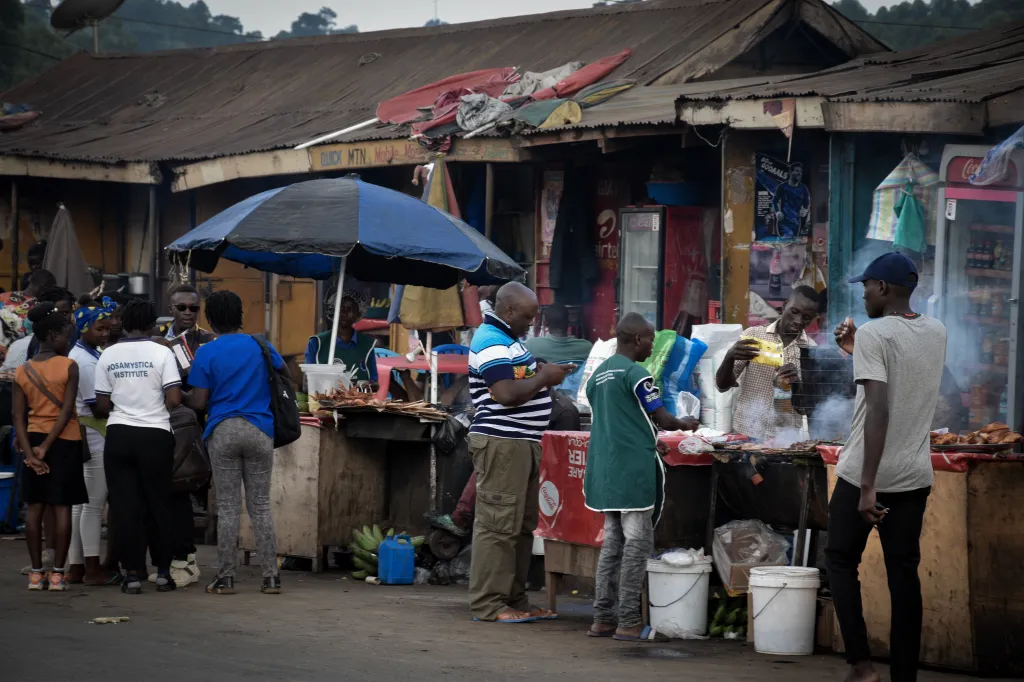
In a post-pandemic world, wet markets remain too narrow a focus in public health. They are just a node among many where zoonoses might emerge. Industrial farming, deforestation, and the global wildlife trade pose graver threats to human health than wet markets do.
“Millions of people around the world rely on wild meat and informal markets. Yes, we need to clamp down on unsustainable and illegal use of wildlife. But demonizing markets, which are a lifeline to many, is not the way to do this,” Roe said.
“A singular focus on wet markets risks ignoring the bigger, but more politically challenging picture.”
Follow Ryan Biller on X @rybiller
The post Wild Danger: The Dilemma of Peru’s Floating City Wet Market appeared first on VICE.
